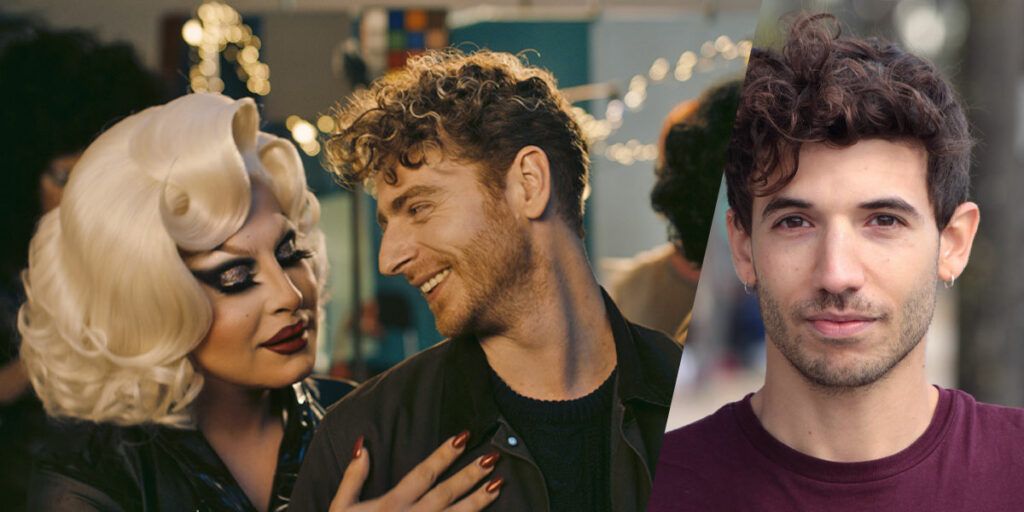Venice interview: Director Florent Gouëlou and stars Pablo Pauly and Romain Eck talk about Three Nights A Week, the opening film of the International Critics’ Week.
The opening film of the 2022 Venice Film Festival’s International Critics’ Week, Florent Gouëlou ‘s Three Nights A Week (Trois Nuits Par Semaine), was a highly enjoyable, one-of-a-kind watch. The movie revolves around a 29-year-old man named Baptiste (Pablo Pauly) who is in a relationship with a girl named Samia (Hafsia Herzi) when he happens to meet a young drag queen named Cookie Kunty (Romain Eck), who completely changes his life. Baptiste decides to develop a photography project around Cookie and her friends, but ends up falling not only for the drag queen but also for Quentin, the young man underneath the make-up.
Three Nights A Week is many things at once: it’s a love story between three people (Baptiste, Cookie, and Quentin), but it’s also a meditation on identity and acceptance, looking at the many parts of ourselves that make us who we are, as well as the snapshot of a specific moment in time in which two people change one another for good. It’s a tale of liberation that doesn’t forget about the fights and the trauma, and it’s ultimately an incredibly enjoyable, charming film that will entertain you, move you, and make you think, and ultimately encourage you to be the best version of yourself.
In the occasion of Three Nights A Week ‘s World Premiere at the 2022 Venice Film Festival, we interviewed director Florent Gouëlou and stars Pablo Pauly and Romain Eck. Read our interview and find out about how the film’s origins and characters, reinventing and discovering one’s self through chance meetings, the metaphorical makeup we wear, the importance of trust, and more.
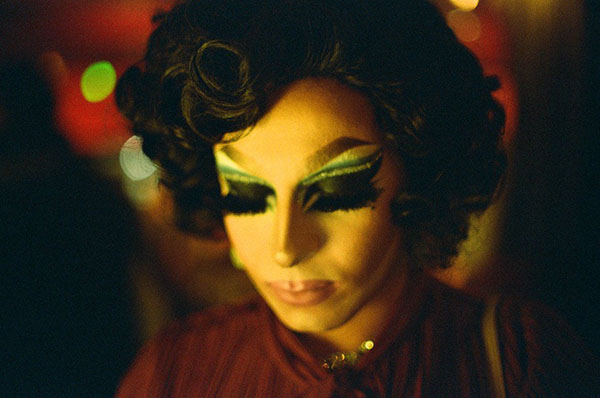
Three Nights A Week ‘s Venice Premiere
Congratulations for Three Nights A Week ‘s Premiere! What was it like to bring the film to the Venice Film Festival?
Florent Gouëlou: It was impressive, moving, and… It was a lot! It was really a lot of emotions. For me, it was kind of a professional birth, and it was amazing to experience it at such a rendez-vous. I am very grateful to Settimana Internazionale della Critica for choosing the film!
Pablo Pauly: It was quite emotional for us. We worked on this film three years ago, two and a half years ago,…
Romain Eck: …, and a year and a half ago! Three years ago, oh my God!
PP: After the pandemic and everything, just to be able to be at this festival is quite an honour for us. Yesterday was quite emotional for for everybody.
R.E.: Yes, it was exciting for me as well: it’s a new thing for me to be in a festival, and even to be in a feature film. It was the first for me, so everything was new. It was a new experience that I can add to my bucket list!
How Three Nights A Week Came to Life
I’d love to talk about the origins of the film! Florent, I know you’ve worked with Romain/Cookie Kunty before, but this is your first feature film together, right?
Florent Gouëlou: Yes, we’ve actually made three short movies together before this one. And it was really a process because the origin of the movies dates back to the day I first saw her on stage, which was also the first time I saw a drag show. It was in 2016, and she was performing in a very tiny club: it was also kind of the beginning for her into her drag journey. And she was… amazing, fascinating, charismatic! I fell in love with the art, the artistry of seeing her performing. At this moment, I was a student at La Fémis, a movie school in Paris, and I was writing my degree film. It was about the different ways a father and a son embrace their own masculinity, and I played a character in it, alongside my own father [Jean-Marie Gouëlou]. It was about cultural differences, with me playing a queer young character and him being more normative in terms of masculinity.
There, I discovered drag, and I started thinking, “okay, if my character was a drag queen, it would be even more relevant.” So this is how I created my own drag persona for the movie, and then, in the years that followed, I kept on working on the subject. At the end, Three Nights A Week is also about me being fascinated by this artistry, and me, as drag artist, knowing what it costs: it’s complicated to find the balance between yourself and your alter ego. The film is inspired by Cookie, of course, but with also a lot of fictional writing. It’s kind of a mixture of all that process.
So how much of you is there in Baptiste, then?
FG: I mainly wanted the film to be about the kind of artistic shock I had when I when I saw Cookie perform. Actually, when I shot those short movies, I decided to have a screening test with Cookie, because I wanted to offer her the role first. Since I discovered that she was also a great actress, we kept on working together and I was able to write more complex characters for her, and to finally bring the guy behind the queen into the movie. So what part of me is in Baptiste? His fascination with the drag world is mine, and also, I think, the way he finds himself as a photographer: as a director, I find myself shooting behind the camera, shooting a film starring drag queens.
Romain, how different was it for you to star in a feature film?
Romain Eck: Oh, yeah, it was actually really different. It was the first time that I was acting out of drag. Having to create a character was new, too, because Quentin is nothing close to me. It’s a whole new experience: it’s a long relationship of two months that you create.
Pablo, how did you get involved in the project?
Pablo Pauly: I read the script. I fell in love with the character, and… I’ve seen many films where heterosexual people try to play homosexual characters, and it wasn’t quite this for me. To me, there was something very wrong with [these portrayals], very caricatural. I wanted to play this character, and I did some tryouts: I loved it! So I said, okay, let’s do this. I didn’t know anything about…
R.E.: … drag!
P.P.: Yes, and I didn’t know anything about homosexuality either. So this was a big challenge for me: I refused many scripts [in the past], but I couldn’t refuse this one. It was a new role: I had never played something like this before, and I said to myself, let’s try.
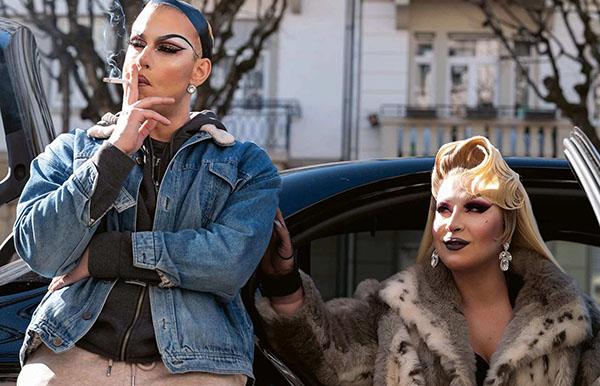
The Central Love Story and Meetings That Transform You Forever
Florent, I read that you described the film as a relationship between three people – Baptiste, Cookie, and Quentin. But isn’t there a fourth person as well? It feels to me like Baptiste is two different people in the movie.
Florent Gouëlou: You’re right! I always consider that Baptiste is just one person who’s metamorphosing, but in a way, you can consider that there are two of them – the old Baptiste and the new one. To me, the movie is really about the authorization you give yourself to re-invent yourself, and to invent yourself, and how you can accept to be surprised by an unexpected desire or meeting happening in your life. And the point for me was to show how some meetings in life transform you forever.
The love affair may or may not work at the end: this is why the end is open. But Baptiste will be changed forever. I feel like he’s closer to his true self, and his essence of himself. With the artists of drag, he embraces his own potential, freedom, and creativity.
So who is Baptiste? Is he the man we see when he’s with his girlfriend, who’s afraid to experience anything, or is he the liberated man who dances with the drag queens?
Romain Eck: I think it’s both: it’s a journey of understanding oneself and exploring…
Pablo Pauly: …And freeing yourself!
R.E.: And love is,… It’s for everyone! It’s just a feeling, so it doesn’t have any boundaries. People can love multiple persons as well: their love is on another level, and there are so many aspects of the love that they share, in between Baptiste and Samia, and Baptiste and Cookie, and Romain as well… So yeah, it’s a foursome! [everyone laughs] And it’s a love story with himself as well, because he discovers so many things.
P.P.: …His true self: there are no lies anymore.
R.E.: Nope, no makeup for for that!
P.P.: This is an interesting idea: you [looks at Romain] put on some makeup, but I had some makeup, and I wiped it off to be my own self!
R.E.: And you discovered your own self through more layers of complexity.
Romain Eck on Three Nights A Week ‘s Cookie Kunty
Romain, how much of the real Cookie Kunty is there in the Cookie we see in the film?
Romain Eck: The Cookie we see is the vessel of the narrative. I have my own version of Cookie, because this is my actual persona that I built seven years ago. The Cookie you see is a version of me that is speaking through the lens of the director and serving the purpose of the movie. They have a lot in common, but I still want to think that she’s a Cookie in time: there’s a big part of me and her in it, but it’s still a version of it.
Was this easier for you to create a new version of Cookie for the film?
R.E.: I don’t think it was easier, because it was a Cookie that was peeking through someone else’s mouth, in a way. But it was cathartic as well, to be exploring Cookie in a whole other aspect, and off stage, mostly. There’s the point where you have this persona on stage, but it doesn’t make any sense to see it outside of the stage, because it’s supposed to be a fantasy. Exploring the weaknesses and the humanity of a drag character is exciting. It’s exciting to see Cookie going through so many things.
Would you like to star in another film?
R.E.: I would love that. Yeah. In or out of drag, or both. I discovered that this world of shooting pictures is exciting. There’s something thrilling about it. It’s an out of body experience, for sure.
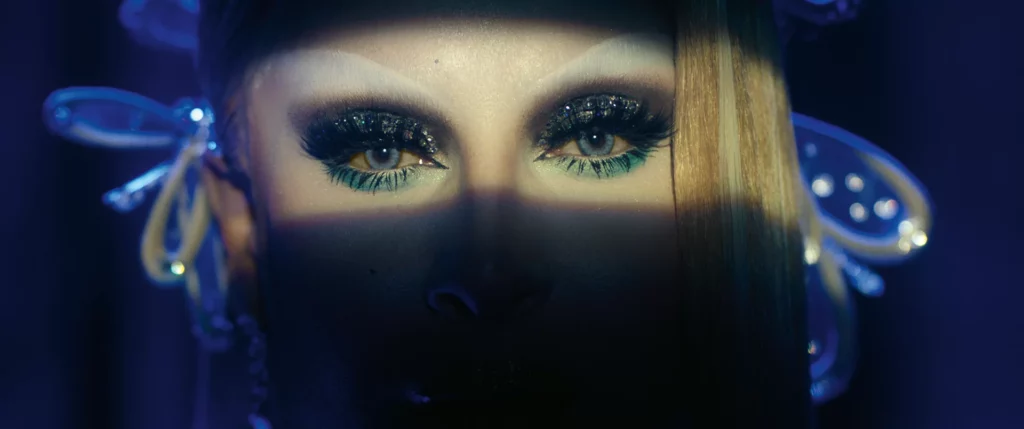
Pablo Pauly & Romain Eck on Shooting the Film
Can we talk about the drawing scene?
Pablo Pauly: We actually shot that on the first day of shooting! It was so cold, and they said, “okay, rip off your clothes!”
Romain Eck: Exactly! And I had the hugest nails ever. [everyone laughs] It was my first day shooting as a boy, out of drag. It was stressful for me, but it’s a cute scene. I think is serves the narrative as well, because Baptiste and Quentin/Cookie are learning each other, as well each other’s body languages and each other’s ways of being. Quentin is being vulnerable by showing Baptiste his inner world, and he’s talking about his youth, or, you know, the woman to whom the place where they are belongs, who used to make him feel at home. Quentin brings Baptiste into this really vulnerable place, and it’s cute that it translated that way, and that it was actually the first shot of the film. I think it helped, because we were still in that discovery of each other as well.
What was the most rewarding scene to shoot for you?
R.E. Actually, Florent asked me which scene I preferred during the Premiere, and I couldn’t tell him. There are so many scenes that I love. And then there are some others that seem really mundane, like everyday stuff, but that I enjoyed so much because their simplicity, and the power behind that simplicity as well. I have so many good memories tied to the movie.
P.P.: The whole film is a reward. You get to go through all these emotions, and I cannot choose just one scene. Every single shot of the movie has its own meaning.
R.E.: We were able to give everything we had to give in that moment in time, and Florent did a great job directing us, and being sensitive to everyone of us, and letting us shine through the movie.
P.P.: You are the reward, actually! The fact that you like the film. The public’s reactions, and you all being here: that’s the reward.
R.E.: Yeah. Even if it’s a strong reaction, because some people will not understand the beauty of the message: love is unconditional and love has no boundaries. We hope that people get it: it’s just a relationship between two souls that try to learn each other and to figure things out as they go within their own journeys. And that’s the most powerful thing in the movie. It’s just a journey of love. That’s it.
Florent Gouëlou on the Paternal Figure in the Film
Florent, can I ask you about the character of Cookie’s uncle, played by Jean-Marie Gouëlou? He’s a relative of yours, isn’t he?
Florent Gouëlou: Yes, he’s my father!
I love that you wrote Romain/Cookie’s uncle as someone who’s so supportive! It’s so wonderful to see characters, and particularly relatives, that are so accepting on film.
FG: In my degree short that I mentioned [Un Homme Mon Fils], he played a fictional version of himself. You can actually see most of the actors and actresses you see in Three Nights A Week in my short movies as well: it was a way to create a sort of “theatre troupe” who’d trust each other, working together: I had to bring them back into this feature. In the movie, my father plays the uncle, but he’s mainly a paternal figure: he’s embracing Quentin and his identity. I guess what I am most touched about is when he says, “I don’t fully understand. But what I know is that he’s doing better now that he has Cookie.” I like how he doesn’t understand but can still recognise how good this is for Quentin, and that, if Quentin is fine, his uncle is fine as well.
It’s the definition of love, isn’t it?
FG: Yes! And acceptance, too. I also wanted to have a generational gap, with an older man who was part of this family. Which is why my father came back! [laughs]
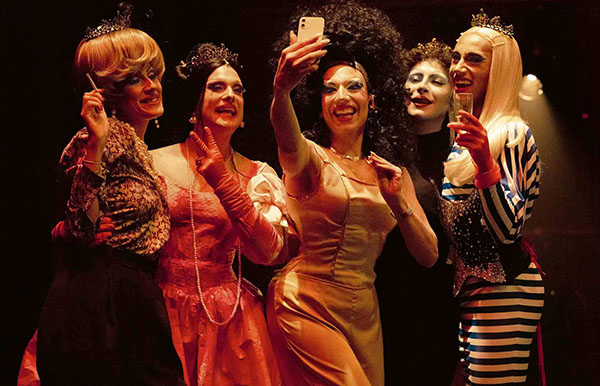
Florent Gouëlou and Romain Eck on Feeling the Characters’ Fights
I love that there’s so much going on in the background. What really struck me about Three Nights A Week is that many important themes are never directly approached but always there: it takes place on World’s AIDS Day, there are constant reminders of the kind of hatred and the struggles that this community is dealing with every day, and it feels as if every single one of these character has lived through a lot.
Florent Gouëlou: I think I’m very much inspired by Almodovar’s films – movies where no character has no storyline. I mean, even if it’s just, like, the guardian of a building: she still has a storyline, a background, an accent… You know where she’s from, you know what she’s eating, but it doesn’t take too much place in the narrative either. I am really fond of Almodovar’s work: it’s what inspired me. If I need a character, let’s do something so that they’re not only useful, but they also have their own history.
How did we do it? I worked with Raphaëlle Desplechin [the film’s co-writer]: she helped me in the writing process. She told me that the more hostile the environment is, the more our characters will look heroic, and we’ll feel their fights. If they only functioned into a safe bubble – which was my first intuition, at the beginning, because I wanted to show that the community was safe – we would not feel the fight, and the subversiveness. And so, this is why you have the scenes with aggression taking place around them: it stays in the context, so that we don’t forget that this is still happening: you can go into the emergency room and be insulted by a stupid guy, or you can be in a car park and a masculine guy can feel that you are taking up too much space. So yeah, it stays around. But I wanted to find the balance between those different dynamics.
You did!
FG: Thank you! And also, It was also really important for me to describe an alternative Paris – a Paris that we are not that much used to seeing in movies. I wanted to really show the night of Paris the way I knew it. Like, the drag scene, but also the medical actions that are taking place outside of the hospital in order to fight against sexual diseases. It was important that all the characters were not rich, and healthy, and at ease in their life.
Romain, there’s a scene that really got to me. Cookie is so bold, shiny, and powerful in the film, but we get to see another side in Quentin. When he’s in a bar with Baptiste, a waitress comes over and looks at Quentin’s long, painted nails, and Quentin immediately hides his hands. Right there, we get to see all the…
Romain Eck: …The thought process, and the trauma as well, in a way. It’s the way we have to behave to survive in life and society. And yeah, it’s true: we put on makeup to be more powerful, in a way. But it also helps us be powerful the rest of the time, even though we still have little bits of fear in us, in some way. And I think Baptiste takes off his makeup because he was afraid of exploring himself. It’s a path towards honesty towards yourself. It’s just a journey of simplicity, in a way, and forgiveness, and…
Pablo Pauly: …Honesty.
R.E.: Yeah, honesty. Yes.
Pablo Pauly and Romain Eck on Trust
How did you work with each other to bring us this amazing chemistry we see in the film?
Pablo Pauly: The main word is trust. I didn’t know anything about the world that Romain was living in, and he didn’t know anything about acting in a feature. I think he trusted me and I trusted him and her.
Romain Eck: Yeah. We had things to learn from each other, and I think that came through in the movie as well. It’s him exploring this whole world, and Quentin/Cookie learning to understand him and let him into his world and her world. Working for four months before the shooting helped as well: you know, getting in touch and working out that sweet spot of the characters just learning each other’s languages.
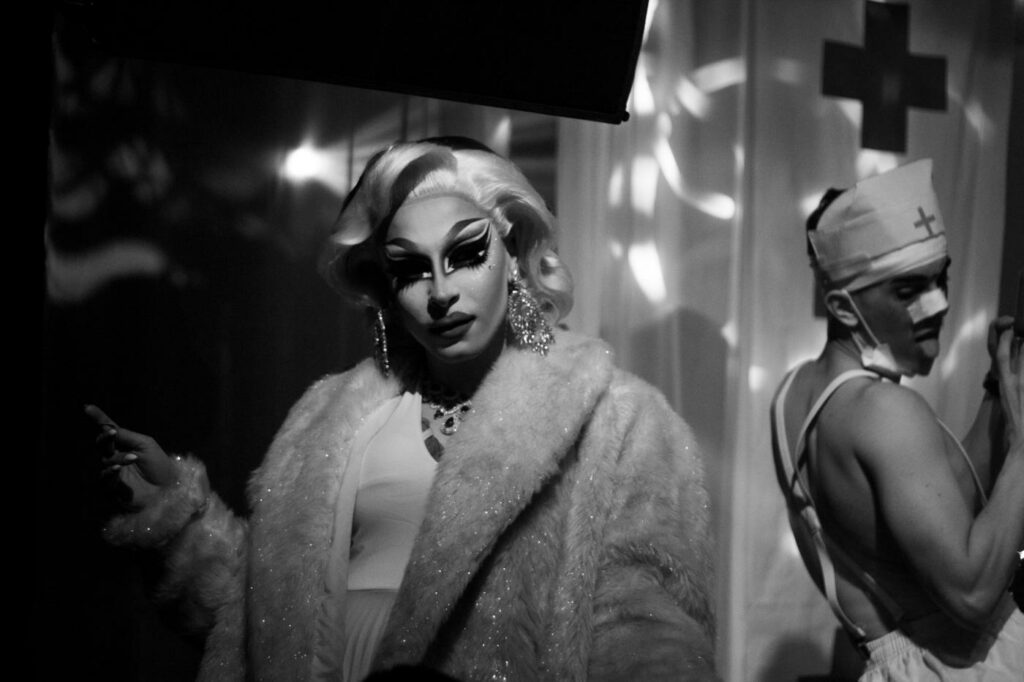
Three Nights A Week ‘s Ending and Baptiste and Quentin/Cookie’s Future
SPOILER ALERT: The question below discusses the end of the film.
Three Nights A Week has one of the most rewarding endings I’ve seen in a long time! I felt so many emotions as I was watching the film, and at some point I got really frustrated when a character was humiliated, but then the film ended: I feel like the entire movie is working towards that conclusion!
Florent, did you always know that this is how it was going to end?
Florent Gouëlou: Yes! I knew there I was playing with echoes: for example, the Carry scene happens twice, the first time when Baptiste is humiliated and the second time, finally, as a way to scream, or to tell his love publicly, and to pay a tribute. He returns the energy, and he offers Cookie something. Baptiste is a very silent character, because he’s looking. And at the end he starts talking, with the stand-up scene. So yes, I’ve been playing with those “mirror” effects. And it’s true: the ending has been prepared through all the movie. My point of view is that, in real life, maybe they wouldn’t finish together. Sometimes you are changed for good by the people you meet, and you think you have to marry them. And finally, you discover that you don’t, and the love affair doesn’t work. But you have definitely been changed by that meeting.
This is what I feel like in life, but for the movie I wanted something more rewarding for the audience, like you said. And it’s a happy ending, because Baptiste has found himself. He’s not struggling anymore, asking, who am I? What do I want? He has made his exhibition and been born into a photographer, and Cookie has lived what she had to live as well.
Pablo and Romain, what do you think happens to Baptiste and Cookie/Quentin in the future?
Romain Eck: Oh, I don’t know!
Pablo Pauly: I don’t want to know. I think Baptiste found himself, and Quentin and Cookie found something else. He needed me, and she needed me, at some point, and I needed him and her: that’s the point. But the movie is just a little bit of time in their lives: they just go through this journey for about two months.
R.E.: It’s a bubble. Baptiste is doing the exhibit, it’s actually supposed to be a year later, and they didn’t see each other for that time period. So Quentin decides to come back. So maybe he’s just showing up, or maybe he wants to continue their relationship, or maybe not. It’s just this bubble of time, and I think there’s no point of trying to know what’s happening next. I think this is just about the journey, and the path of finding one’s self: just exploring love and understanding each other, and letting go of fears. There’s no need of something else after that story, because it’s all about the path. It’s the journey that counts.
P.P.: And actually, it’s a decision for each of us to take. I have my point of view on this, you have your point of view, Florent has his point of view… That’s the magic of cinema. To me, they’re not together.
R.E.: And there’s proof in the movie that reinventing yourself can happen everyday. There’s no end to discovering yourself: there’s no end goal. The goal is just the journey.
This interview has been edited for length and clarity.
Three Nights A Week opened the International Critics’ Week at the 2022 Venice Film Festival on September 2, 2022, and will be released in France on November 9. Read our review of Three Nights A Week!

